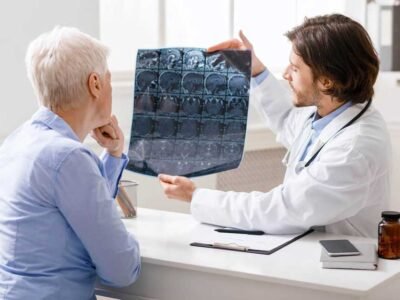As women approach menopause, their ovaries produce less progesterone and estrogen hormones – the hormones primarily responsible for controlling their monthly cycle. However, they also affect the health of the heart, bones, and vagina.
Reduced production of female hormones can cause menopausal symptoms such as hot flashes, insomnia, vaginal dryness, and painful sex. Although most of these symptoms often disappear on their own after a few years, they sometimes last longer than expected, causing severe side effects on the affected women.
However, following the advancements in the medical field, it is now possible to replace these hormones using artificially prepared versions. This process is known as Hormone Replacement Therapy (HRT). Read on to find out more about HRT, what it entails, its benefits, and who is a suitable candidate.
What is HRT?
Hormone replacement therapy is a therapeutic procedure that uses female hormonal medications to relieve the symptoms of menopause.
Types of HRT
Generally, HRT focuses on replacing the estrogen hormone that your body no longer produces during menopause. However, depending on your hormonal needs, your doctor may also prescribe progesterone medications. There are two basic types of HRT estrogen therapy, as outlined below:
- Systemic hormone therapy: This form of HRT involves the use of pills, creams, sprays, skin patches, rings, or gels. It is popular for its high estrogen levels, which is absorbed throughout the body, making it effective in easing common menopausal symptoms.
- Low-dose vaginal products: These low-dose vaginal products come in the form of tablets, rings, or creams, and they minimize the amount of estrogen absorbed into the body. Therefore, they are useful in relieving vaginal and urinary tract symptoms.
Before starting a course of HRT, it is important to talk to a doctor to understand the procedure’s risks and benefits. Although it has some hazards, its advantages seem to outweigh the drawbacks.
7 Benefits of HRT
Here are some of the common benefits of HRT:
Improves Urogenital Symptoms
Urogenital symptoms in menopause include vaginal dryness, vaginal discharge, genital itching, frequent urination, and recurring urinary tract infections, among others. Such symptoms can affect your confidence, self-esteem, and intimate relations with your partner.
To counter these symptoms, you can adopt HRT, an effective remedy for urogenital menopausal symptoms. HRT has a proliferative effect on the urethral epithelium and the bladder, improving symptoms of frequent and uncontrolled urination.
Additionally, this procedure improves vaginal atrophy by decreasing PH levels and increasing epithelial maturation.
Improves Vasomotor Symptoms
Most women in menopause experience hot flashes, flushes, and night sweat, collectively known as vasomotor symptoms. HRT is effective in reducing their frequency and intensity.
Reduces Osteoporosis Risk
Osteoporosis is a bone condition characterized by weak and brittle bones. Bones can become so weak that even a minor fall can cause serious fractures. In extreme cases, minor bumps or even sneezing cause breakages.
Women in menopause are at a high risk of osteoporosis due to the reduced estrogen levels. Estrogen increases bone mineral density (BMD), reducing the risk of osteoporosis. Therefore, HRT is effective in preventing osteoporosis in women with menopausal symptoms. Although effectiveness depends on the dosage, HRT achieves a significant level of improvement even with small doses.
Improves Moods
One of the common symptoms of menopause is mood changes, which can affect your relations with others. A 2018 study found that HRT was effective at preventing the development of clinically significant depressive symptoms. It helps improves your spirits and can be a good depression remedy when combined with cognitive-behavioral therapy.
Reduces Migraines
Recurring migraines are common in menopause, mainly due to hormonal fluctuations. They worsen as you get deeper into the menopause phase. However, you can reduce their frequency using HRT, which tends to balance your hormones.
Improves the Quality of Life
Most women have a hard time adapting to this new phase of life, characterized by lack of sleep, muscle pains, mood swings, and weight gain in many cases. However, HRT can give you a smooth transition as it improves sleep and reduces muscle aches.
Improves Skin Health
Generally, menopause comes with old age, and you are likely to start having wrinkles and saggy skin. However, with HRT, your skin’s elasticity, thickness, hydration, and collagen content are likely to increase. These improvement results from the estrogen hormone, which has positive impacts on hormonal aging. Additionally, HRT improves wound healing.
Who Can Benefit From HRT
With the benefits above, almost every woman in menopause would be willing to try out this procedure. However, although suitable for most women experiencing menopausal symptoms, it is not recommended if you have the following conditions:
- A history of ovarian cancer, breast cancer, or womb cancer, which may also be detected early through geneType risk assessment and other tests.
- High blood pressure
- Liver disease
- A history of blood clots
- You are pregnant: It is still possible to get pregnant while experiencing menopausal symptoms, especially if you are younger than 50. Therefore, you should continue taking contraception for at least two years if you are under 50 years old and for one year if you are over 50.
Conclusion
Menopause is an inevitable phase of life as a woman. If you feel overwhelmed in dealing with its symptoms, you should consider trying out HRT. Try it today to have a smooth menopause and post-menopause phase.












